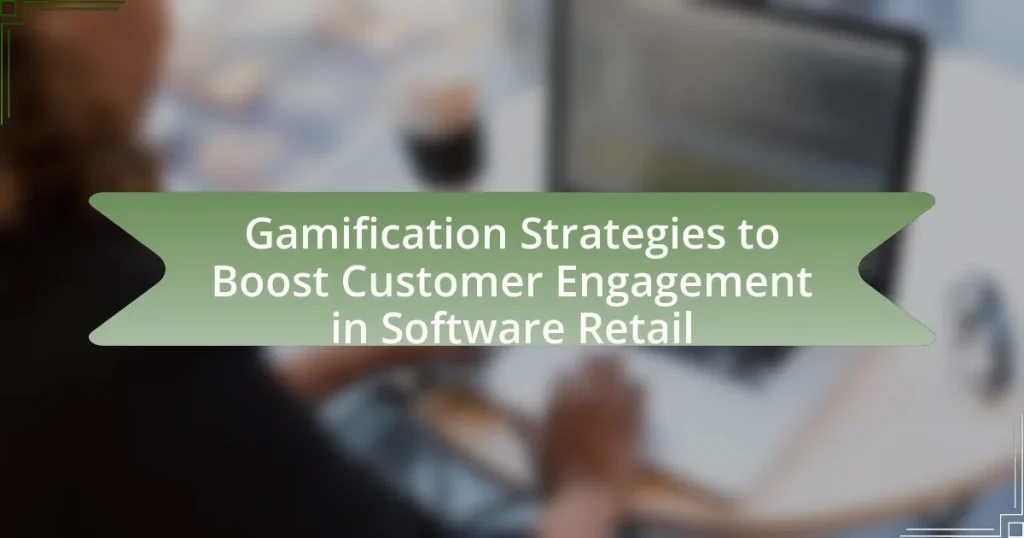The article focuses on the role of social media in enhancing customer engagement within the software sales sector. It outlines how social media facilitates direct communication, allowing companies to share updates, gather feedback, and address inquiries, which ultimately boosts customer satisfaction and loyalty. Key platforms such as LinkedIn and Twitter are highlighted for their effectiveness in reaching target demographics and fostering relationships. The article also discusses the importance of customer preferences in shaping social media strategies, the significance of customer engagement for retention and revenue growth, and best practices for leveraging social media to improve interaction and build community among customers. Additionally, it emphasizes the need for businesses to measure engagement metrics and adapt strategies based on analytics to optimize their social media presence.
What is the role of social media in customer engagement for software sales?
Social media plays a crucial role in customer engagement for software sales by facilitating direct communication and interaction between companies and their customers. This platform allows software companies to share updates, gather feedback, and address customer inquiries in real-time, enhancing customer satisfaction and loyalty. According to a 2021 report by Hootsuite, 54% of social media users utilize these platforms to research products, indicating that effective engagement can significantly influence purchasing decisions. Additionally, social media enables targeted marketing campaigns, allowing software companies to reach specific demographics, which can lead to higher conversion rates.
How can social media enhance customer relationships in software sales?
Social media enhances customer relationships in software sales by facilitating direct communication and engagement between companies and their customers. This platform allows software companies to respond promptly to customer inquiries, share valuable content, and gather feedback, which fosters a sense of community and trust. According to a study by Sprout Social, 70% of consumers feel more connected to brands with CEOs who are active on social media, indicating that personal engagement can significantly strengthen customer relationships. Additionally, social media analytics provide insights into customer preferences and behaviors, enabling software companies to tailor their offerings and improve customer satisfaction.
What specific social media platforms are most effective for software sales engagement?
LinkedIn and Twitter are the most effective social media platforms for software sales engagement. LinkedIn is particularly valuable due to its professional focus, allowing software companies to connect with decision-makers and industry professionals. According to a HubSpot report, 80% of B2B leads come from LinkedIn, highlighting its effectiveness in generating business opportunities. Twitter, on the other hand, facilitates real-time communication and engagement, enabling software companies to share updates, interact with customers, and participate in industry conversations. A study by Sprout Social found that 77% of users feel more positive about a brand when their tweet has been replied to, demonstrating the platform’s potential for customer engagement.
How do customer preferences influence social media strategies in software sales?
Customer preferences significantly influence social media strategies in software sales by guiding content creation, platform selection, and engagement tactics. For instance, if customers prefer visual content, software companies may prioritize video tutorials and infographics on platforms like Instagram and YouTube. Additionally, understanding customer demographics helps in choosing the right social media channels; younger audiences may favor TikTok, while professionals might engage more on LinkedIn. Research indicates that 73% of marketers believe that social media marketing has been effective for their business, highlighting the importance of aligning strategies with customer preferences to enhance engagement and drive sales.
Why is customer engagement important in software sales?
Customer engagement is crucial in software sales because it directly influences customer retention and revenue growth. Engaged customers are more likely to remain loyal, leading to repeat purchases and referrals, which are essential for sustainable business success. According to a study by Gallup, companies with high customer engagement scores achieve 23% higher profitability compared to their less engaged counterparts. This demonstrates that fostering strong relationships through effective communication and interaction can significantly enhance sales performance in the software industry.
What are the key metrics for measuring customer engagement in software sales?
The key metrics for measuring customer engagement in software sales include Customer Lifetime Value (CLV), Net Promoter Score (NPS), Customer Acquisition Cost (CAC), and engagement rate on social media platforms. CLV quantifies the total revenue expected from a customer throughout their relationship with the company, indicating the long-term value of customer engagement. NPS measures customer loyalty and satisfaction by asking how likely customers are to recommend the software to others, providing insight into overall engagement. CAC assesses the cost associated with acquiring a new customer, helping to evaluate the effectiveness of marketing strategies. Lastly, engagement rate on social media reflects how actively customers interact with the brand online, which is crucial for understanding customer sentiment and engagement levels. These metrics collectively provide a comprehensive view of customer engagement in software sales.
How does effective customer engagement impact sales performance?
Effective customer engagement significantly enhances sales performance by fostering stronger relationships and increasing customer loyalty. Engaged customers are more likely to make repeat purchases, leading to higher sales volumes. According to a study by Gallup, businesses with highly engaged customers experience a 23% increase in sales compared to those with lower engagement levels. This correlation highlights that effective engagement strategies, such as personalized communication and active social media interaction, directly contribute to improved sales outcomes.
What strategies can be implemented for effective customer engagement on social media?
To achieve effective customer engagement on social media, businesses should implement strategies such as personalized content, active interaction, and leveraging user-generated content. Personalized content, which tailors messages to individual customer preferences, has been shown to increase engagement rates significantly; for instance, studies indicate that personalized emails can lead to a 29% higher open rate. Active interaction involves responding promptly to customer inquiries and comments, fostering a sense of community and trust; research shows that brands that engage with customers on social media see a 20-40% increase in customer loyalty. Lastly, leveraging user-generated content encourages customers to share their experiences, which not only enhances brand authenticity but also boosts engagement, as posts featuring user content receive 28% more engagement than standard brand posts.
How can content marketing be utilized for customer engagement in software sales?
Content marketing can be utilized for customer engagement in software sales by creating valuable, relevant content that addresses customer pain points and interests. This approach fosters trust and builds relationships, as potential customers are more likely to engage with brands that provide informative resources such as blogs, whitepapers, and case studies. According to a HubSpot report, companies that prioritize content marketing experience six times higher conversion rates compared to those that do not. By leveraging social media platforms to distribute this content, software companies can enhance visibility and encourage interaction, leading to increased customer engagement and ultimately driving sales.
What types of content resonate most with software sales customers on social media?
Educational content, such as how-to guides, webinars, and case studies, resonates most with software sales customers on social media. This type of content provides valuable insights and practical knowledge that help potential customers understand the software’s benefits and applications. According to a survey by HubSpot, 70% of consumers prefer to learn about a company through articles rather than ads, highlighting the effectiveness of educational content in engaging software sales customers.
How often should content be posted to maximize engagement?
To maximize engagement, content should be posted at least three to five times per week on social media platforms. Research indicates that posting consistently within this frequency range can significantly enhance visibility and interaction rates. For instance, a study by HubSpot found that brands posting 16 times per month on Facebook receive 3.5 times more engagement than those posting less frequently. This frequency allows for maintaining audience interest while avoiding content fatigue, thereby optimizing engagement levels effectively.
What role does customer feedback play in social media engagement?
Customer feedback plays a crucial role in social media engagement by providing insights that help businesses tailor their strategies to meet customer needs. This feedback allows companies to understand customer preferences, identify areas for improvement, and foster a sense of community. For instance, a study by Sprout Social found that 64% of consumers want brands to connect with them on social media, highlighting the importance of responsive engagement based on customer input. By actively incorporating feedback into their social media interactions, businesses can enhance customer satisfaction and loyalty, ultimately driving sales in the software industry.
How can businesses effectively gather and respond to customer feedback on social media?
Businesses can effectively gather and respond to customer feedback on social media by actively monitoring their platforms, utilizing feedback tools, and engaging directly with customers. Active monitoring involves using social media listening tools to track mentions, comments, and reviews related to the business, which allows for timely responses. Feedback tools, such as surveys and polls, can be integrated into social media channels to solicit specific insights from customers. Engaging directly with customers through personalized responses demonstrates that the business values their input, fostering a positive relationship. According to a study by Sprout Social, 70% of consumers feel more connected to brands that respond to them on social media, highlighting the importance of engagement in customer feedback processes.
What are the best practices for addressing negative feedback in software sales?
The best practices for addressing negative feedback in software sales include actively listening to the customer, responding promptly, and providing a solution. Actively listening ensures that the customer’s concerns are fully understood, which can help in de-escalating the situation. Responding promptly demonstrates that the company values customer feedback and is committed to resolving issues. Providing a solution not only addresses the specific complaint but also reinforces customer trust and loyalty. According to a study by Microsoft, 96% of consumers say customer service is important in their choice of loyalty to a brand, highlighting the significance of effectively managing negative feedback.
How can businesses measure the effectiveness of their social media engagement strategies?
Businesses can measure the effectiveness of their social media engagement strategies by analyzing key performance indicators (KPIs) such as engagement rate, reach, and conversion rate. Engagement rate, calculated by dividing the total interactions (likes, shares, comments) by total followers, provides insight into how well content resonates with the audience. Reach indicates the number of unique users who see the content, helping businesses understand their visibility. Conversion rate, which measures the percentage of users who take a desired action (like signing up for a newsletter or making a purchase), directly correlates social media efforts to business outcomes. According to a report by Sprout Social, brands that actively track these metrics can improve their engagement strategies by up to 30%, demonstrating the importance of data-driven decision-making in social media marketing.
What tools are available for tracking social media engagement metrics?
Tools available for tracking social media engagement metrics include Hootsuite, Sprout Social, Buffer, and Google Analytics. Hootsuite provides comprehensive analytics on post performance and audience engagement across multiple platforms. Sprout Social offers detailed reports on engagement metrics, including likes, shares, and comments, allowing users to analyze trends over time. Buffer simplifies social media management and provides insights into engagement rates and audience demographics. Google Analytics tracks referral traffic from social media and measures user behavior on websites, providing a broader view of engagement. These tools are widely recognized for their effectiveness in measuring social media engagement.
How can analytics inform future social media strategies in software sales?
Analytics can inform future social media strategies in software sales by providing data-driven insights into customer behavior and engagement patterns. By analyzing metrics such as click-through rates, conversion rates, and audience demographics, software companies can identify which content resonates most with their target audience. For instance, a study by HubSpot found that companies using data analytics to guide their social media strategies saw a 30% increase in lead generation. This evidence demonstrates that leveraging analytics allows businesses to tailor their messaging and optimize their social media campaigns, ultimately enhancing customer engagement and driving sales.
What are some common challenges faced in social media customer engagement?
Common challenges faced in social media customer engagement include managing customer expectations, responding promptly to inquiries, and maintaining consistent brand messaging. Managing customer expectations is crucial as customers often expect immediate responses and personalized interactions, which can strain resources. Responding promptly is essential; studies show that 42% of customers expect a response within an hour, and delays can lead to dissatisfaction. Maintaining consistent brand messaging across various platforms is also challenging, as discrepancies can confuse customers and damage brand credibility.
How can businesses overcome these challenges to improve engagement?
Businesses can overcome challenges to improve engagement by implementing targeted social media strategies that focus on understanding customer needs and preferences. By utilizing analytics tools, businesses can gather data on customer interactions and feedback, allowing them to tailor content and communication effectively. For instance, a study by Sprout Social found that 70% of consumers feel more connected to brands with a strong social media presence, highlighting the importance of consistent and relevant engagement. Additionally, fostering two-way communication through interactive content, such as polls and Q&A sessions, can enhance customer involvement and satisfaction.
What are the best practices for successful customer engagement on social media in software sales?
The best practices for successful customer engagement on social media in software sales include actively responding to customer inquiries, sharing valuable content, and utilizing targeted advertising. Actively responding to customer inquiries fosters trust and builds relationships, as studies show that 70% of consumers expect brands to respond to their inquiries within an hour. Sharing valuable content, such as tutorials and industry insights, positions the brand as a thought leader and encourages engagement; research indicates that content marketing can generate three times more leads than traditional marketing. Utilizing targeted advertising ensures that the right audience sees the software solutions, increasing the likelihood of engagement and conversion, with data showing that targeted ads can improve conversion rates by up to 50%.
How can businesses create a consistent brand voice across social media platforms?
Businesses can create a consistent brand voice across social media platforms by developing a comprehensive brand style guide that outlines tone, language, and messaging. This guide serves as a reference for all team members, ensuring uniformity in communication regardless of the platform. Research indicates that brands with a consistent voice can increase customer trust and engagement by up to 23%, as highlighted in a study by Lucidpress. By adhering to the style guide, businesses can effectively convey their identity and values, fostering a cohesive presence that resonates with their audience across various social media channels.
What tips can enhance interaction and build community among software sales customers?
To enhance interaction and build community among software sales customers, companies should actively engage through personalized communication and community-driven platforms. Personalized communication, such as tailored emails and targeted social media interactions, fosters a sense of connection and relevance, leading to increased customer loyalty. Community-driven platforms, like forums or social media groups, allow customers to share experiences, ask questions, and provide feedback, creating a collaborative environment. Research indicates that 70% of consumers feel more connected to brands that engage with them on social media, highlighting the importance of these strategies in building a strong community among software sales customers.



